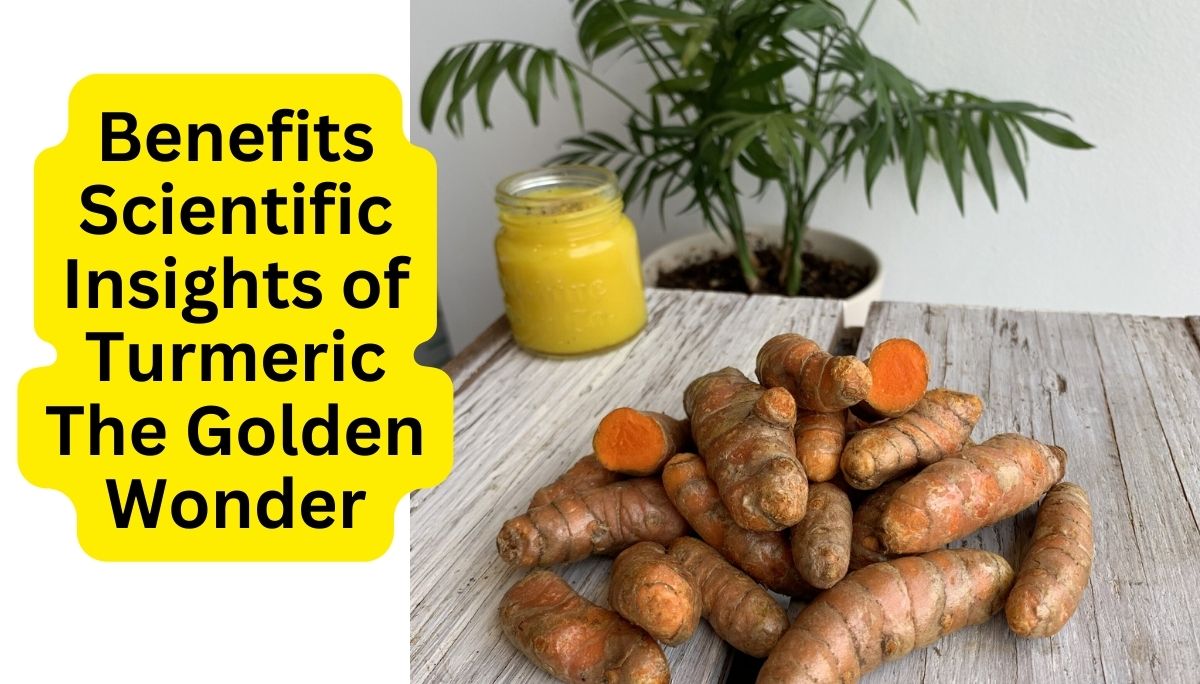Benefits of Turmeric – Remarkable Health Benefits, Therapeutic Uses, and Scientific Insights – The Golden Wonder
Turmeric, the vibrant golden spice, has been revered for centuries for its medicinal properties. Let’s delve into its myriad health benefits and discover why it’s considered a powerhouse in traditional medicine.

Table of Contents
The Ancient Origins of Turmeric
Turmeric, the vibrant golden spice that has graced kitchens and traditional medicine practices for thousands of years, is more than just a culinary delight. This potent root, native to the lush landscapes of Southeast Asia, has been revered for its remarkable healing properties since ancient times.
In Ayurvedic medicine, a holistic system deeply rooted in Indian culture, turmeric has been celebrated as a powerful ally for overall well-being. Its unique compound, curcumin, is believed to be the driving force behind many of its therapeutic benefits, making turmeric a true superfood in the world of natural remedies.
Harnessing the Anti-Inflammatory Powers
One of the most well-documented benefits of turmeric is its ability to combat inflammation, a underlying factor in numerous chronic conditions. Curcumin, the active compound in turmeric, has been extensively studied for its anti-inflammatory properties, which can help alleviate pain, swelling, and discomfort associated with conditions like arthritis, joint pain, and inflammatory bowel diseases.
According to research published in the Journal of Medicinal Food, curcumin’s potent antioxidant and anti-inflammatory effects may also play a role in protecting against various chronic diseases, including cancer, cardiovascular disease, and neurological disorders.
Boosting Brain Health and Cognitive Function
Beyond its anti-inflammatory powers, turmeric has also garnered attention for its potential to support brain health and cognitive function. Curcumin has been found to possess neuroprotective properties, which may help to combat oxidative stress and inflammation in the brain, two key factors implicated in neurodegenerative diseases like Alzheimer’s and Parkinson’s.
Furthermore, studies have suggested that turmeric may improve memory and cognitive performance, particularly in older adults. The UCLA Alzheimer’s and Dementia Care Program highlights the promising research on turmeric’s potential to enhance cognitive function and delay the onset of age-related cognitive decline.
Supporting Digestive Wellness
Turmeric’s benefits extend beyond its anti-inflammatory and neuroprotective properties; it also plays a role in supporting digestive health. The compound curcumin has been found to possess antioxidant and anti-inflammatory effects that can help soothe the digestive tract and alleviate symptoms associated with conditions like irritable bowel syndrome (IBS), ulcerative colitis, and Crohn’s disease.
Additionally, turmeric may aid in promoting a healthy gut microbiome, as suggested by research published in the Journal of Nutritional Biochemistry. A balanced gut microbiome is crucial for proper digestion, nutrient absorption, and overall immune function.
A Versatile Culinary Companion
Beyond its medicinal properties, turmeric is a versatile and flavorful addition to any kitchen. Its warm, earthy aroma and vibrant golden hue can elevate the taste and visual appeal of countless dishes, from curries and stews to smoothies and lattes.
For culinary inspiration and delicious turmeric-infused recipes, explore the Minimalist Baker website, which offers a wealth of plant-based, nutrient-dense dishes that showcase the versatility of this golden spice.
Frequently Asked Questions: Benefits of Turmeric
Q: How much turmeric should I consume for potential health benefits?
A: While there is no definitive daily recommended amount, most experts suggest consuming between 500mg to 2g of curcumin per day for potential therapeutic effects. However, it’s important to note that curcumin has relatively low bioavailability, so consuming it with black pepper or other bioavailability enhancers may improve absorptio
Q: Are there any side effects or interactions with turmeric?
A: Turmeric is generally considered safe when consumed in moderate amounts as a spice or supplement. However, high doses or long-term use may cause side effects such as upset stomach, nausea, or diarrhea. Additionally, turmeric may interact with certain medications, such as blood thinners, so it’s essential to consult with a healthcare professional before taking turmeric supplements, especially if you have a pre-existing medical condition or are taking prescription medications.
Q: Can turmeric be used topically?
A: Yes, turmeric can be used topically for its anti-inflammatory and antimicrobial properties. It has been traditionally used in various skin care products and remedies to treat conditions like eczema, acne, and wound healing. However, it’s essential to conduct a patch test before applying turmeric directly to the skin, as some individuals may experience irritation or allergic reactions.
Q: Is turmeric safe for pregnant or breastfeeding women?
A: While moderate consumption of turmeric in food is generally considered safe during pregnancy and breastfeeding, it’s recommended to consult with a healthcare professional before taking turmeric supplements, as the safety and potential effects on the developing fetus or nursing infant are not well established.
Q: Is turmeric safe for everyone to consume?
A: While turmeric is generally safe, individuals with gallbladder issues, diabetes, or those taking blood-thinning medications should exercise caution and consult a healthcare professional before consuming turmeric supplements.
Q: Can turmeric help with weight loss?
A: While turmeric may aid in weight management due to its anti-inflammatory properties and potential to improve digestion, it’s not a magic solution for weight loss. Incorporating turmeric into a balanced diet and active lifestyle may support overall health and well-being.
Q: How can I incorporate more turmeric into my diet?
A: There are numerous ways to incorporate turmeric into your daily diet. You can add it to smoothies, soups, curries, and stews, or use it as a seasoning for roasted vegetables or proteins. Turmeric lattes, also known as “golden milk,” have become increasingly popular as a delicious and nutritious way to consume this powerful spice.
Embrace the golden power of turmeric and unlock a world of potential health benefits. From its anti-inflammatory properties to its cognitive-enhancing and digestive-supporting effects, this ancient spice offers a natural and holistic approach to overall well-being. Incorporate turmeric into your culinary adventures, and experience the vibrant flavors and nourishing qualities of this truly remarkable superfood.